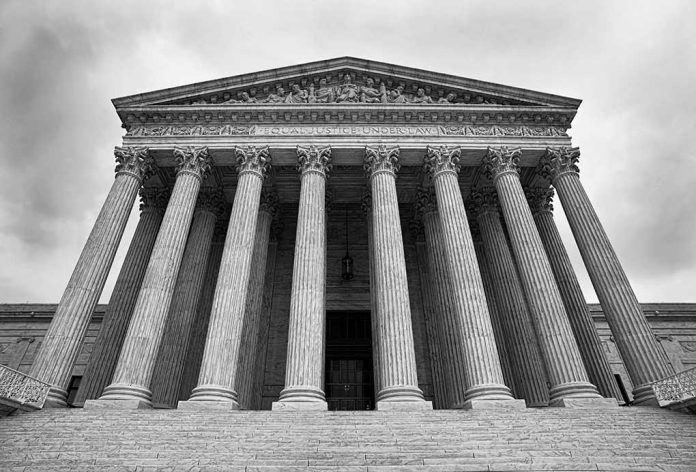
The U.S. Supreme Court unanimously overturned two convictions against former Chicago Alderman Patrick Daley Thompson, distinguishing between “misleading” and “false” statements in a ruling that could impact how federal prosecutors pursue similar cases nationwide.
Key Takeaways
- The Supreme Court unanimously overturned Patrick Daley Thompson’s convictions related to statements about loans from a failed bank, sending the case back to the 7th Circuit.
- Chief Justice Roberts emphasized a critical legal distinction: “A misleading statement can be true, and a true statement is not false” – establishing that federal law only criminalizes false statements, not merely misleading ones.
- Thompson, related to two former Chicago mayors, was convicted in 2022 for allegedly lying to FDIC regulators about $219,000 in loans from Washington Federal Bank for Savings.
- The Court’s ruling establishes an important precedent limiting the scope of prosecutions under Section 1014 of Title 18 of the U.S. Code.
Supreme Court Draws Clear Line on Criminality of Statements
In a decision that could reshape federal prosecutions nationwide, the Supreme Court overturned the convictions of former Chicago Alderman Patrick Daley Thompson. The unanimous ruling, authored by Chief Justice John Roberts, focused on a key distinction in federal law between statements that are “false” versus merely “misleading.” Thompson, the grandson of former Mayor Richard J. Daley and nephew of former Mayor Richard M. Daley, had been sentenced to four months in prison in 2022 after being convicted of making false statements to federal bank regulators regarding loans from Washington Federal Bank for Savings.
The case stemmed from a broader investigation into the 2017 collapse of Washington Federal Bank for Savings, which involved a significant embezzlement scheme. Thompson had taken out loans totaling $219,000 from the bank in 2011. After the bank’s failure and subsequent FDIC takeover, Thompson disputed the invoiced amount of $269,120.58, claiming he had borrowed only $110,000. This statement became central to his eventual prosecution under Section 1014 of Title 18 of the U.S. Code, which prohibits making false statements to influence federal regulators.
Supreme Court Votes 9–0 to Overturn Convictions of Former Chicago Alderman
The Seventh Circuit upheld Patrick Daley Thompson’s convictions for making false statements to the FDIC even though the statements were considered misleading.The Supreme Court on March 21 unanimously… pic.twitter.com/6w8mJTkSN0
— Claire (@ClaireGarcia161) March 22, 2025
Legal Reasoning Behind Unanimous Decision
The Court’s ruling hinged on the precise language of the federal statute, which specifically criminalizes “false” statements but makes no mention of “misleading” ones. Thompson’s defense had argued that his statement about borrowing $110,000 could be considered literally true depending on how “borrowing” was defined, even if it might have been misleading in context. The Supreme Court agreed this distinction matters significantly under the law.
Chief Justice Roberts provided a clarifying example in his written opinion, explaining that a doctor telling a patient they had performed a hundred surgeries would be misleading if 99 patients had died, yet the statement itself would still be factually true. This illustrates how a statement can be simultaneously true and misleading, a crucial distinction when applying criminal statutes that specifically target falsehoods.
Background and Implications
Thompson’s legal troubles began following the closure of Washington Federal Bank for Savings in 2017. The bank’s president, John Gembara, was found dead in a customer’s home shortly before the bank’s closure, with his death ruled a suicide. The subsequent investigation revealed widespread fraud at the institution. Thompson had made only one payment on his loans before the bank failed, and his defense portrayed him as overwhelmed by his multiple roles and struggling with tax details.
Following his conviction in February 2022, Thompson resigned his position as alderman of Chicago’s 11th Ward, a seat with deep historical connections to the Daley political dynasty. Then-Mayor Lori Lightfoot appointed Nicole Lee to fill the vacancy. The Supreme Court’s decision now sends the case back to the 7th Circuit Court of Appeals for further proceedings consistent with this new interpretation of the law, potentially opening the door for Thompson to challenge his conviction on new grounds.
Broader Impact on Federal Prosecutions
The ruling could have significant implications for federal prosecutors nationwide who have previously pursued cases under Section 1014 based on statements that might be characterized as misleading rather than explicitly false. The Supreme Court’s clear delineation between these categories establishes a higher threshold for future prosecutions, requiring the government to prove actual falsity rather than mere deception through technically true statements.
The unanimous nature of the decision suggests a strong consensus on limiting the scope of criminal liability for statements made to federal officials. While this represents a victory for Thompson and potentially other defendants in similar situations, it also creates clearer boundaries for federal prosecutors to navigate when building cases around allegedly deceptive statements to government agencies.
Sources:
Supreme Court tosses convictions on 2 counts for former 11th Ward Ald. Patrick Daley Thompson
Supreme Court Rules for Chicago Politician in Bank Fraud Case
Supreme Court Votes 9-0 To Overturn Convictions Of Former Chicago Aderman







